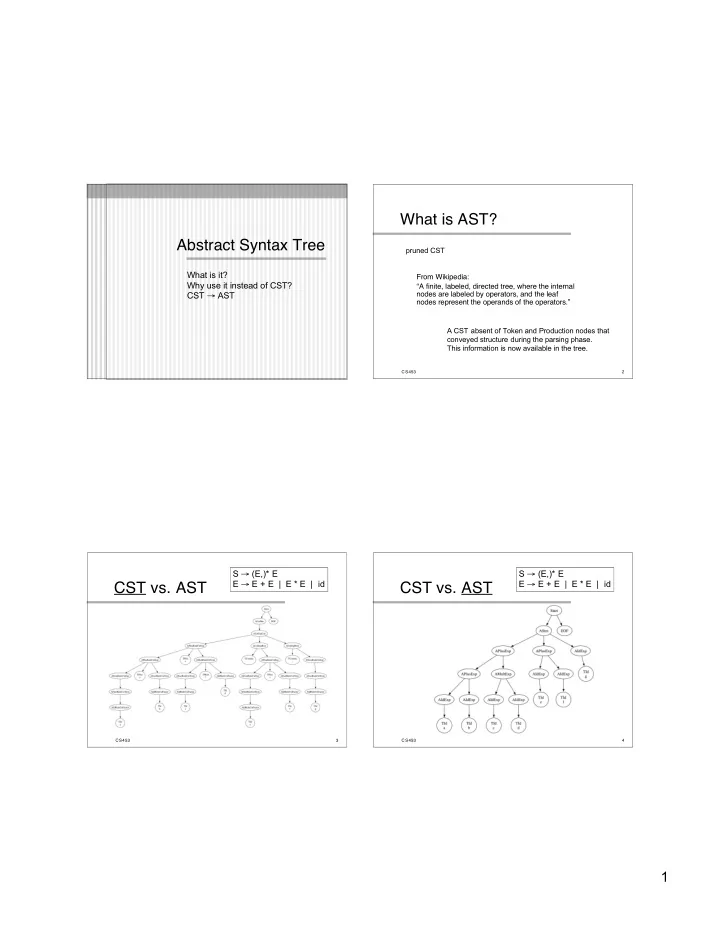

What is AST? Abstract Syntax Tree pruned CST What is it? From Wikipedia: Why use it instead of CST? “A finite, labeled, directed tree, where the internal CST → AST nodes are labeled by operators, and the leaf nodes represent the operands of the operators.” A CST absent of Token and Production nodes that conveyed structure during the parsing phase. This information is now available in the tree. CS453 2 S → (E,)* E S → (E,)* E E → E + E | E * E | id E → E + E | E * E | id CST vs. AST CST vs. AST CS453 3 CS453 4 1
FN → LN , FN CST → AST Why use it? CST clean Productions cst_full_name = [last]:name comma [first]:name; closer to BNF grammar AST more convenient than CST Productions cst_full_name {-> full_name} = [last]:name comma [first]:name {-> New full_name(first, last)}; I want more curly braces in my sableCC grammar file. Abstract Syntax Tree full_name = [first]:name [last]:name; CS453 5 CS453 6 CST AST CS453 7 CS453 8 2
E → E + E | id CST → AST CST Productions cst_exp {-> exp} = {plus_rule} cst_exp plus cst_term {-> New exp.plus(cst_exp.exp, cst_term.exp)} | {term_rule} cst_term {-> cst_term.exp}; cst_term {-> exp} = id {-> New exp.id(id)}; Abstract Syntax Tree exp = {plus} [left]:exp [right]:exp | {id} id; CS453 9 CS453 10 OL → O* CST → AST O → name : attribute AST Productions cst_objects {-> objects} = cst_object* {-> New objects([cst_object.object])}; cst_object {-> object} = [name]:alpha_str colon [attribute]:alpha_str {-> New object(name, attribute)}; Abstract Syntax Tree objects = object*; object = [first]:alpha_str [last]:alpha_str; CS453 11 CS453 12 3
CST AST CS453 13 CS453 14 NL → ((FN:)* FN)? CST → AST FN → LN , FN CST Productions (without transformations, your turn) cst_names = cst_name_list?; cst_name_list = cst_name_list_item* cst_name_last_item; cst_name_list_item = cst_full_name colon; cst_name_last_item = cst_full_name; cst_full_name = [last]:name comma [first]:name; Abstract Syntax Tree names = full_name*; full_name = [first]:name [last]:name; CS453 15 CS453 16 4
NL → ((FN:)* FN)? CST → AST FN → LN , FN AST Productions cst_names {-> names} = cst_name_list? {-> New names([cst_name_list.full_name])}; cst_name_list {-> full_name*} = cst_name_list_item* cst_name_last_item {-> [cst_name_list_item.full_name, cst_name_last_item.full_name]}; cst_name_list_item {-> full_name} = cst_full_name colon {-> cst_full_name.full_name}; cst_name_last_item {-> full_name} = cst_full_name {-> cst_full_name.full_name}; cst_full_name {-> full_name} = [last]:name comma [first]:name {-> New full_name(first, last)}; Abstract Syntax Tree names = full_name*; full_name = [first]:name [last]:name; CS453 17 CS453 18 S → E (, E)* CST → AST E → E + E | E * E | id CST Productions (without transformations, your turn) cst_stm = cst_exp_list; cst_exp = {plus_rule} cst_exp plus cst_term | {term_rule} cst_term; cst_term = {mult_rule} cst_term mult cst_factor | {fact_rule} cst_factor; cst_factor = {id_rule} id; cst_exp_list = cst_exp cst_exp_rest*; cst_exp_rest = comma cst_exp; Abstract Syntax Tree stm = exp+; exp = {plus} [left]:exp [right]:exp | {mult} [left]:exp [right]:exp | {id} id; CS453 19 CS453 20 5
S → E (, E)* CST → AST E → E + E | E * E | id AST Productions cst_stm {-> stm} = cst_exp_list {-> New stm([cst_exp_list.exp])}; cst_exp {-> exp} = {plus_rule} cst_exp plus cst_term {-> New exp.plus(cst_exp.exp, cst_term.exp)} | {term_rule} cst_term {-> cst_term.exp}; cst_term {-> exp} = {mult_rule} cst_term mult cst_factor {-> New exp.mult(cst_term.exp, cst_factor.exp)} | {fact_rule} cst_factor {-> cst_factor.exp}; cst_factor {-> exp} = {id_rule} id {-> New exp.id(id)}; cst_exp_list {-> exp+} = cst_exp cst_exp_rest* {-> [cst_exp.exp, cst_exp_rest.exp]}; cst_exp_rest {-> exp} = comma cst_exp {-> cst_exp.exp}; Abstract Syntax Tree stm = exp+; exp = {plus} [left]:exp [right]:exp | {mult} [left]:exp [right]:exp | {id} id; CS453 21 CS453 22 Wednesday Going over some of the suggested exercises from the textbook. Email me with exercises that you want covered. CS453 23 6
Recommend
More recommend